“Give me a Turkish army. I will conquer the world,” said Napoléon Bonaparte. Fortunately for us, no-one ever did, although he came pretty close with his French army. As with Adolf Hitler in the last century, his downfall came when he tried to conquer Russia. Turkey’s unpredictable President – the country’s 12th – has avoided stepping into the war over Ukraine, but has remained astutely positioned on the edges. Turkey has announced that it is blocking warships from entering the Bosphorus and Dardanelles Straits, in line with a convention that gives it control over the passage of military vessels through what is a strategic area. So far, four Russian warships have been turned away. “We have alerted both countries of the region (Russia and Ukraine) and elsewhere not to pass warships through the Black Sea,” Foreign Minister Mevlut Cavusoglu said. “We are applying the Montreux Convention.” The convention, which dates from 1936, governs the free movement of commercial ships in peacetime through the Bosphorus and the Dardanelles Straits.
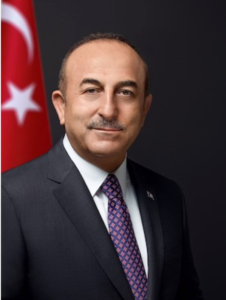
It has long been an area of strategic importance, with the straits linking the Aegean Sea, which is part of the Mediterranean, Turkey’s Marmara inland sea and the Black Sea. My grandfather, an Engineer Commander in the Royal Navy, had his ship sunk under him at the Dardanelles during the First World War, only escaping with difficulty from the engine room wearing only his underpants. Steam turbine engines got very hot. For many years, my mother had a fragment of the shattered glass from the Dardanelles Lighthouse mounted on an ebony base (lost years ago during house clearances) and I still have in front of me a disarmed Turkish 75mm Howitzer shell that landed on my grandfather’s ship without exploding. He had the explosives removed and mounted it on also on an ebony base. Back in those days, the writing on the shell was still in Arabic.
The European External Action Service (EEAS) has said for a long time that it sees Turkey as a potential EU member state. After all, it has been a NATO member since 1952. On its website, the EEAS points out that: “The European Union is committed to enlargement, a strategic investment in peace, democracy, prosperity, security, and stability in Europe.
Turkey remains a candidate country for the EU membership and a key partner in many areas of joint interest such as migration, counterterrorism, economy, and trade.” At the moment the biggest obstacle to membership is almost certainly Turkey’s President, Recep Tayyip Erdoğan. There have been massive demonstrations in Istanbul and other cities over Erdoğan’s autocratic rule and his suppression of civil rights.
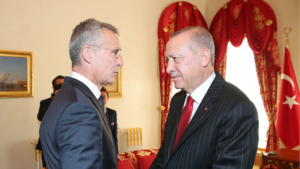
Turkey said it planned to make adultery illegal, having dropped the plan earlier because it would block accession to the EU. “No further chapters can be considered for opening or closing and no further work towards the modernisation of the EU-Turkey Customs Union is foreseen,” the Commission said at the time.
But that doesn’t mean that the EU is turning its back on Turkey. How could it, when Turkey is the EU’s 6th largest trading partner, representing around 3.6% of the EU’s total global trade in goods in 2020? The EU is important for Turkey, too. In 2020, around 33.4% of Turkey’s imports came from the EU, which also accepted 41.3% of its exports. The total value of trade between them was around €132.4-billion. That is a lot of revenue by any standards. Most of Turkey’s exports to the EU were machinery and transport equipment, which also, strangely, dominated EU exports to Turkey. Other goods included clothing, agriculture, and raw materials, as well as fuel and mining products. It’s been a very long courtship. An Association Agreement between Turkey and what was then known as the European Economic Community (EEC) was signed back in 1963, with a protocol that brought the two sides closer, entering into force ten years later. A full Customs Union was enacted on 31 December, 1995, since when trade between the two has increased more than four-fold. Trade is one thing, however; complying with EU rules and standards is another, and that’s where things get tricky.
LOCKING UP AND LOCKING OUT
Observers note that Turkey currently comes nowhere near to fulfilling the eligibility criteria for EU membership, which supposedly guarantees democracy, the rule of law, human rights, and a working market economy. They have also pointed out that the EU has never managed to arrest Turkey’s backsliding on what it considers to be democratic norms. Indeed, Erdoğan seems to simply shrug off any demands the EU makes for his country to meet Western standards, despite the fact that on most global issues the two sides are fairly closely aligned. On civil rights, however, they are not.
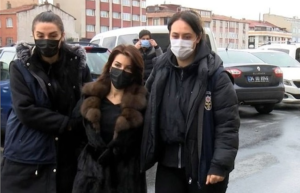
For instance, Turkish journalist Sedef Kabas has been jailed by a Turkish court, pending her trial, charged with insulting Erdoğan (something most other leaders tend to shrug off as the price one must pay to be in charge). She was taken to a court where a judge confirmed her formal arrest. It was shortly afterwards confirmed again at the main courthouse. What is she accused of? Live on Tele 1, a TV channel linked to an opposition party, she said: “There is a very famous proverb that says that a crowned head becomes wiser, but we see it is not true. A bull does not become king just by entering the palace, but the palace becomes a barn.” She could have faced up to up to 4 years in jail but was released after just 7 days.
Erdoğan’s chief spokesperson, Fahrettin Altun, criticised Kebas’s comment, saying: “I condemn the vulgar insults made against our president in his office.” He won’t enjoy EU membership much, then, if Turkey ever achieves it; EU leaders are constantly insulted, often in the media and rather more rudely than that. Kabas has denied the charge anyway and has been supported by the Chief Editor of Tele 1, Merdan Yanardag, who said: “Her arrest at 2 am because of a proverb is unacceptable. This is an attempt to intimidate journalists, the media and society.” Not a very successful one, either, it would appear. The European Court of Human Rights has called upon Turkey to change or revoke its laws on “insulting the president”.

But Turkey has form in this area; it’s not the first time it has allegedly over-reacted to a mild rebuke or a little criticism. There seems to be a concerted attack on prominent women at the moment as well. A pro-government Islamist group heavily criticised Turkish pop singer Sezen Aksu for sharing on YouTube a 5-year-old song called “How Wonderful to be Alive”, in which there is a reference to Adam and Eve, whom the song refers to as “those ignorant ones”. Erdoğan himself threatened reprisals against Aksu because Islam views Adam as a prophet and that therefore Aksu has insulted Islam.
The European Court of Human Rights has even brought action against the Turkish government for what it deems to be political arrests and detentions. The court has also
called on Turkey to change its legislation after it ruled that a man’s detention under the law violated his freedom of expression. That would seem to be an understatement: thousands have been charged and sentenced for allegedly insulting Erdoğan. That’s quite a record for the eight years since he moved from being prime minister to president. Just to set the record straight, since 2014, when Erdoğan became president, 160,169 investigations have been launched over alleged insults to him, with 35,507 cases filed and 12,881 convictions.
A few years ago, Erdoğan even attempted to have a German comedian prosecuted in his own country for reciting a poem on television that Erdoğan found offensive. At that point, enter The Spectator magazine, which launched a competition with a cash prize for the person who came up with the most amusing (but very insulting) poem about Erdoğan, which was won by Britain’s then-Foreign Secretary, now Prime Minister, Boris Johnson. I won’t repeat it here because it’s rather rude, but it promises to be an interesting summit meeting should the two leaders ever come face-to-face.
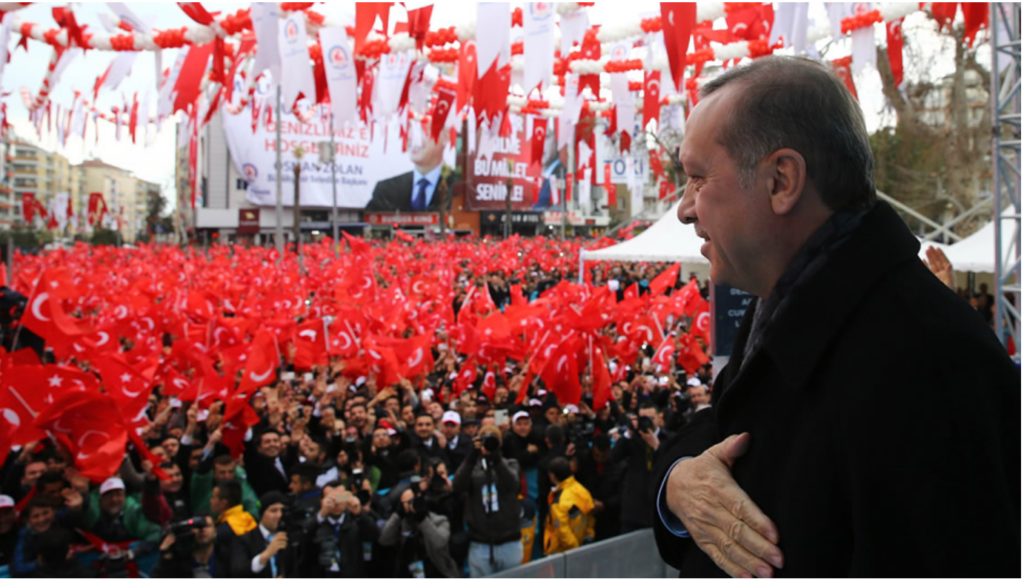
This likely antipathy hasn’t prevented Turkey from flooding British TV channels with adverts for itself as a holiday destination. Practically every advertisement break carries a beautifully shot and expertly edited advertisement for the country’s many delights, from the wonderful bazaars of Istanbul to the beaches of its coastal regions. They look very tempting and extremely beautiful, and they are. I haven’t sampled the beaches, I’m afraid, not being much a beach person, but I have adored Istanbul when I have been there. Apart from all the sights and its glorious mosques, its people are very friendly and its cafés serve glorious Turkish coffee (of course) – strong and black, as it should be. Interestingly, however, the adverts do not show people at prayer, wearing Islamic clothes or – in the case of women – wearing the hijab, the commonest type of veil. It’s a brief sort of garment to cover only the hair and is usually worn with conventional clothes. Something similar was obligatory in the Christian West until surprisingly recently. The hijab, however, falls far short of the all-covering burqa that is prominent in Afghanistan and parts of Pakistan. This would not merit comment were it not for the way in which Erdoğan seems to be sliding towards following a stricter form of Shariah law. That doesn’t quite gel with the bikini-clad girls in those television ads, unveiled and all-but undressed.
STRONG FAITH CAN KILL YOU
I certainly would not denigrate Shariah Law, nor any form of religious orthodoxy, Muslim, Christian or Jewish, as long as people are not forced under threat of reprisals to adopt it, but it has been common practice down the ages for tyrants to hide their more ludicrous and cruel acts behind their religion; don’t blame me, blame God.
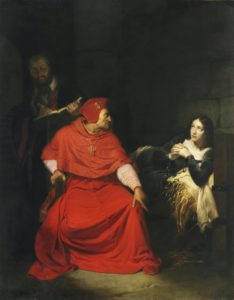
That’s what pro-English church clerics – supposedly holy men – did on 30 May, 1431, to Joan of Arc, or St. Joan, as she became eventually. With the help of some English sections of the church, a religion supposedly followed by both sides in the war, they had concocted accusations against her including: “heresy, witchcraft and violating divine law for dressing like a man”. Who knows what they would have made of today’s fashions, or the miniskirts of the 1960s? She told her judges that she had been obliged to dress as a man while in the English-supporting Duke of Burgundy’s prison, where she was held for a time, because, she said, if she dressed as a woman the English soldiers molested her, which seems likely. It has even been said that she was raped there by an English member of the aristocracy, also very likely.
Her trial judges recorded the following in their notes of the trial: “We say and determine that you have falsely imagined revelations and divine apparitions, that you are a pernicious temptress, presumptuous, credulous, rash, superstitious, a false prophetess, a blasphemer against God and his saints, scornful of God in his sacraments, a transgressor of divine law, sacred doctrine, and ecclesiastical decrees; that you are seditious, cruel, apostate, schismatic, straying in many ways from our faith; and that in these ways you have rashly sinned against God and his Church.” Utter nonsense, of course, but nonsense carefully dressed up in sacred robes. Her death was a terrible travesty of justice to an extremely religious (perhaps one might even say over-religious?) teenager who had, against all expectations, led the French army to victory during what became known as the Hundred Years War. She was burned to death at the stake at the age of just 19. The English, of course, failed to conquer France, thanks in large measure to the heroic if illiterate peasant girl, Joan from Domrémy, a village in north-eastern France. But that’s the sort of thing you get if you dress politics and violent hatred up as religious faith. Of course, Erdoğan would never have one of his detractors burned at the stake, but his reaction to criticism is pointing towards a similar type of attitude, albeit at a less deadly and ghastly level. Turkey cannot, of course, be compared with Russia, which, quite apart from the thousands it has killed in Ukraine, has arrested some 13,500 peaceful anti-war protestors and, it’s been claimed, has been inflicting torture on some of them. In a straight choice between inviting Erdoğan around for tea and inviting Vladimir Putin, there is absolutely no contest: Recep clearly wins out over Vlad.
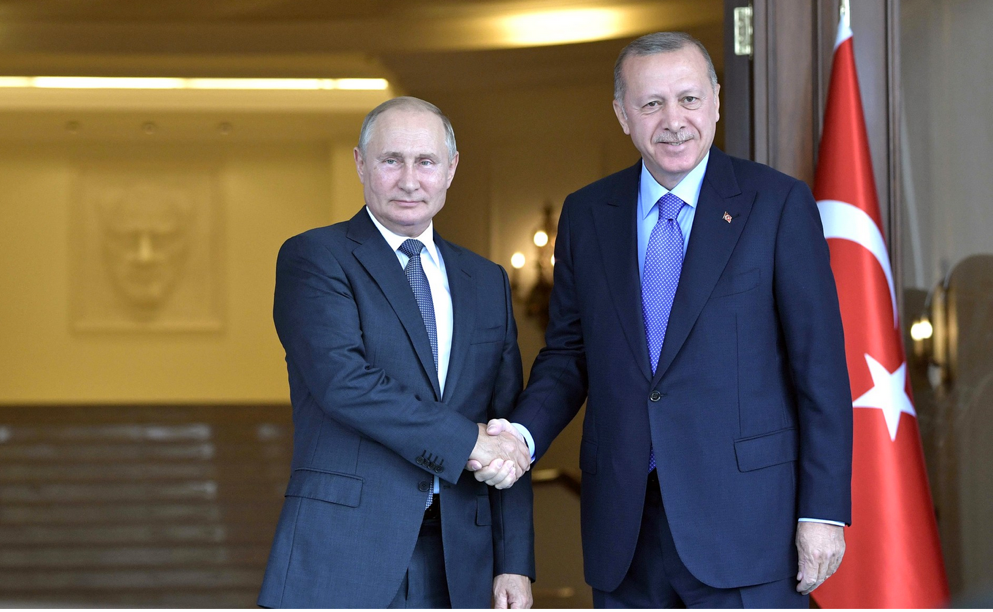
In many fields, Turkey and the EU remain fairly close. As the European Commission states, Turkey plays a full part in EU research and innovation programmes and has done since 2003. In 2004, Turkey launched the Turkish Research Area (TARAL), which is modelled on the European Research Area (ERA). It’s said that Turkey has made good progress, especially in the ERA Priorities connected with e-infrastructures, open data and gender mainstreaming in research projects. In 2019, Turkey launched a series of measures that led to the establishment of an Action Plan to boost its own research and innovation capacity, as well as in cooperation and alignment with the ERU’s own European Research Area. This could lead to it having a tangible impact on Turkey’s participation in Horizon 2020 and its scheduled successor, Horizon Europe. Turkey has made steady progress in Horizon 2020 and turned out to be especially successful in “the European Research Council, in Marie Skłodowska-Curie Actions, and in the area of Energy research,” the Commission says on its website. It also points out that Turkey is still a “key strategic partner” on such issues as migration, security, counter-terrorism and the economy, despite, as it puts it, “backsliding in the areas of democracy, rule of law and fundamental rights”.
FAR AWAY IS NEAR AT HAND IN IMAGES OF ELSEWHERE
Another point that worries the EU, in addition to its “democratic backsliding”, is what seems to be an increasingly unilateral foreign policy. A European Parliament report – called an In-Depth Analysis (IDA) – says that Turkey is still seen as a candidate for EU membership, a key partner in economic matters and trade and a “strategic partner”, which is a phrase that is arguably open to interpretation. The IDA argues that recent tensions, over the Mediterranean, Syria and Libya, have affected (the IDA says “shaped”) EU-Turkey relations. The report argues that it is various “interchanging dynamics” (not my choice of phrase) that have led to the situation in which we find ourselves.

“It concludes that the differences between EU institutions and their preferences among the array of existing frameworks when it comes to EU-Turkey relations make it very difficult to find a well-functioning way forward.” I assume that means simply that they don’t agree on several points, making progress difficult, to put it in simpler language. The report says that the EU-Turkey relationship should be ‘rebalanced’ in terms of ‘conflictual cooperation’ (it’s full of such obtuse phraseology), including sounder cooperation driven by mutual interests and confidence-building measures. Dealings between the two sides also need a ‘functional rules-based relationship’ that works better than the current negotiations under the accession framework. The IDA also suggests “engaging with Turkey under the umbrella of multilateral organisations”. These would include NATO, but also other international bodies. The IDA also wants to encourage Turkey to join with the EU and other “like-minded partners” in promoting “forward-looking global agendas”, more closely integrating Turkey into EU agendas with a longer-term objective, on such matters as public health, the COVID pandemic having demonstrated why that’s necessary.
The opening phrase of this paragraph quotes an obscure bit of graffiti that at one time decorated London’s Paddington Station. It was a time of much graffiti, and no-one was ever able to identify the “artist”, still less what he meant by it (although I suspect his – or her – inspiration came from marijuana or some hallucinogenic drug). The wall on which it was written in paint has long since been demolished. The language of the IDA is almost as obscure, where references are made to Turkey: “Since they hold competences when it comes to foreign and security policy-making, the dynamics of cooperation with Turkey become even more complicated.” In some ways, however, Russia’s illegal and violent incursion into Ukraine may point the way to a better solution.
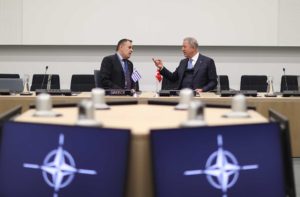
“Europe’s efforts to phase down gas imports from Russia,” comments the Al-Monitor website, “might place Turkey at the centre of routes for alternative supplies from Azerbaijan and Israel.” That would doubtless be a good things for those concerned, although it comes nowhere near to compensating for all the death and destruction Putin has been unleashing on Russia’s much smaller neighbour. As journalist Muhdan Saglam writes: “European efforts to phase down Russian energy supplies could offer Turkey a fresh opportunity to overcome the deadlocks in its foreign policy, improve its frayed ties with the West and enhance its regional standing. Being both a NATO member and an EU membership candidate makes Turkey a more reliable transit route for gas supplies to Europe.”
It’s one thing to be presented with an opportunity but quite another to seize it. We must remember that Russia is the world’s second-largest producer of natural gas after the United States and the third largest producer of oil, supplying Europe with some 40% of its natural gas consumption and up to 30% of its oil. Isn’t it wonderful what fossilised plants and seaweed can do?
Turkey has been, of course, a very active member of the Council of Europe (CoE), a somewhat looser alliance of European states, mainly committed to the rule of law, human rights and cultural issues. However, the CoE acknowledges a debt to the EU in taking that relationship forward: “Most of the co-operation activities with Turkey have been undertaken via European Union/Council of Europe Joint Programmes, and Turkey remains the biggest Beneficiary of the technical co-operation with the European Union.” However, it’s mainly in the CoE’s chief areas of competence that it’s involvement with Turkey is most clear: “The assistance has been provided in the field of fundamental rights, through the provision of support to the strengthening of democratic culture in basic education based on universal core values, and through the capacity building of Bar Associations and lawyers on European human rights standards.” The CoE has also been working in close cooperation with the EU on the very sort of reforms Turkey’s critics have been requesting and trying to work towards: “This support contributes to the strengthening of the institutional capacity of the Court of Cassation and to building public confidence in the Turkish judiciary (particularly in administrative matters) by enhancing its efficiency, effectiveness, independence and impartiality.” Not for the first time, it’s necessary to cite Erdoğan as a major obstacle to progress.
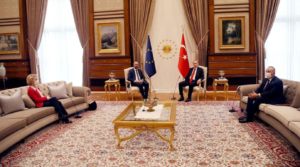
PLAYING BY THE RULES?
The Turkish authorities have been criticised many times over their response to judicial matters. Quite recently, the CoE’s Committee of Ministers urged Turkey to pay the “just satisfaction” awarded by the European Court of Human Rights to the relatives of nine Greek Cypriots who ‘disappeared’ during Turkey’s military invasion of Cyprus in 1974. The lack of effective investigations into the disappearances were found by the European Court back in 2009 to have violated the European Convention on Human Rights. The Court ruled that Turkey must pay €108,000 in damages and a further €72,000 in costs and expenses to relatives of the people who vanished. The money remains unpaid and in an interim resolution, the CoE’s Committee of Ministers expressed grave concern at what it called “flagrant disrespect of Turkey’s international obligations as a member of the Council of Europe and party to the European Convention on Human Rights.” Since Turkey chose to invade and occupy the northern part of Cyprus, the whereabouts of hundreds of people remain unknown. It has been suggested that Turkey may even get expelled from the Council altogether. What’s more, Turkey has declined to impose sanctions against Russia as the EU (and many other countries) wanted. It condemned Russia’s invasion and attempt to annex Ukraine but it could hardly do more, given that it has been occupying a quarter of Cyprus since 1974.
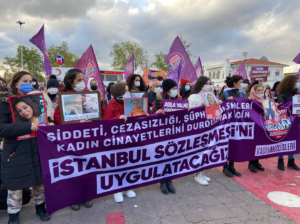
Turkey, under a previous president, ardently pushed to get its own Convention on preventing gender violence, the Istanbul Convention, through the Council of Europe and onto the statute books, and it succeeded, for which it was widely applauded. As the Council puts it on its own website: “The Istanbul Convention recognises violence against women as a violation of human rights and a form of discrimination against women. Based on a victim-centred approach, it offers practical tools to ensure the protection of women and girls, their safety and empowerment. It links these to the wider goal of achieving equality between women and men.” It is the most comprehensive legal framework that exists to tackle violence against women and girls, covering domestic violence, rape, sexual assault, female genital mutilation (FGM), so-called honour-based violence, and forced marriages. Under Erdoğan, however, Turkey has now withdrawn from it, which shocked and disappointed many of its partner countries. Last November, the German newspaper Der Tagesspiegel sought to explain Erdoğan’s disregard for the rule of law. “The Turkish president won’t be intimidated by the criticism from the West,” Istanbul correspondent Susanne Güsten wrote: “He controls most of the media in Turkey and claims that his country is a squeaky-clean constitutional state of which America and Europe are so envious that they continually hurl baseless accusations at it.” The Istanbul Convention was opened for signature in Istanbul on 20 May 2011 and Turkey itself was the first to ratify it in 2012. Since then, it has been adopted by 45 countries and the European Union itself. Quitting it will not help Turkey’s supposed bid to join the EU.
Where domestic or any other form of violence against women is concerned, however, Erdoğan, who insists he is devout in his Muslim faith, should, perhaps, recall the Qu’ran, which demands that women should be treated fairly, although, in the verses about women, it also suggests that violence is allowed, at least between man and wife. The passage is phrased in language that few today would endorse: “Men are the managers of the affairs of women for that God has preferred in bounty one of them over another,” reads part of Verse 39 of the Sura headed An-Nisa, ‘The Women’, “and for that they have expended of their property. Righteous women are therefore obedient, guarding the secret of God’s guarding. And those you fear may be rebellious, admonish; banish them to their couches, and beat them.” Not a solution I would endorse or recommend.
Perhaps, however, that’s why Erdoğan chose to disassociate himself from the Convention his country had drafted and fought for in the Council, persuading other countries to support it. After all, apart from that suggestion that it’s OK for a man to beat his wife, elsewhere the Qu’ran insists that men and women are equal in the eyes of God: “Surely, men who submit themselves to God and women who submit themselves to Him, and believing men and believing women, and obedient men and obedient women, and truthful men and truthful women, and men steadfast in their faith and steadfast women, and men who are humble and women who are humble, and men who give alms and women who give alms, and men who fast and women who fast, and men who guard their chastity and women who guard their chastity and men who remember Allah much and women who remember Him – Allah has prepared for all of them forgiveness and a great reward.” Allah may have done, but apparently Erdoğan has not.
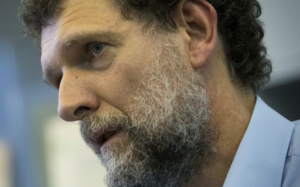
Nor has Erdoğan complied with a ruling of the European Court of Human Rights demanding the immediate release of human rights defender Osman Kavala, a ruling that Turkey has been ignoring for two years. As a result the Committee of Ministers has started infringement proceedings against Turkey that could see it forced out of the Council altogether. The campaigning organisation Human Rights Watch (HRW) reported that: “The court found that by using detention for political ends, Turkey had violated Kavala’s rights, including the right to liberty, and had abused the discretion given to governments to impose legitimate limitations on rights, under articles 5 and 18 of the European Convention on Human Rights, respectively.” Expulsion would not be immediate, but a suspension of Turkey’s voting rights could be. Turkey must be aware that this is a serious development. As HRW points out: “The Kavala judgment is legally binding, yet the Turkish authorities have snubbed the Strasbourg court and ignored the decisions of the Committee of Ministers, which represents the Council’s 47 member states, calling for his release and the full restoration of his rights.” It would seem that Erdoğan doesn’t feel obliged to fulfil his obligations, even at the risk of losing his country’s chance for membership of the CoE and with it any hope of joining the EU.
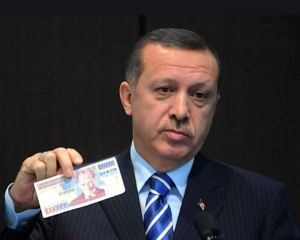
Not everything is going well for Turkey, even if you ignore the impasse over EU membership and application of European Court of Human Rights judgements. By early March this year, the Turkish lira had lost yet more of its value, while annual inflation hit a record high of 54% because of the rising cost of fuel. Supporting – or not supporting – Putin’s Russia comes at a price. The Turkish Statistical Institute announced that the prices of consumer goods rose by almost 5% in February alone because of the cost of energy. According to the figures, producer prices have increased over the past year by a staggering 105%. The lira has lost close to half of its value over the past 12 months. Predictably, Erdoğan blamed the lira’s fall and the disastrous price rises on what he called “foreign financial tools” without really specifying what they are. It’s never his fault. One of the Court’s judgements wasn’t enacted, his government protested, because it had been ‘poorly translated’. I love Turkey, or at least I love that wonderfully chaotic and colourful city of Istanbul. I’m afraid my deep affection doesn’t really extend to Recep Tayyip Erdoğan. The last time I was in Istanbul, the walls of coffee bars, restaurants and public buildings were covered with images of Mustafa Kemal Atatürk, the father of the modern Turkish state. I don’t know if they’re still there, but I hope so. Countries should be proud of their histories. With Turkey’s deepening divide with Europe – and its apparent abandonment of the rule of law – I cannot see Erdoğan’s picture taking their place any time soon.

